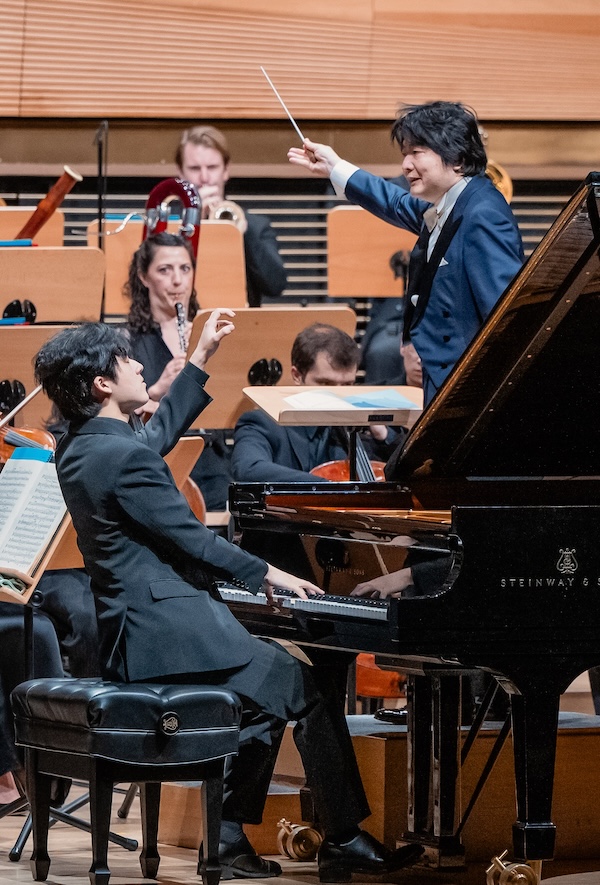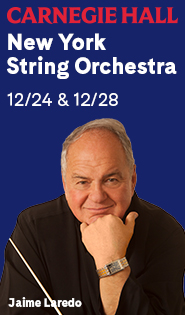Cliburn winner Lim shows his elegant style in Chopin with the Philharmonic

The New York Philharmonic achieved a trifecta with its combination of a brilliant young pianist, the exciting debut of a rising conductor, and crowd-pleasing repertoire on Wednesday evening.
The pianist was Yunchan Lim, at age 18 the youngest winner of the Van Cliburn Competition, who played Chopin’s Piano Concerto 2. Kazuki Yamada was the conductor.
Yamada, the music director of the City of Birmingham Symphony Orchestra and the Orchestre Philharmonique de Monte-Carlo, led off the evening with Dai Fujikura’s Entwine.
Commissioned by the WDR Symphony Cologne in November 2020 as a response to the Covid-19 pandemic, Entwine was composed when Fujikura was under lockdown with his family in their small London apartment. His objective was to compose an orchestral work that reflected the solitariness of that time by expressing what was missing—namely, shared communal experiences.
Under Yamada’s baton, Entwine emerged as a shimmering progression of sounds embraced by one section of the orchestra before being passed on to another with long transparent strands of tone colliding in exquisite dissonances. The musicians’ string playing had an almost supernatural sheen, as did the transparent waves of brass sound. Just a few minutes long, Entwine cast a pensive mood, which nicely complemented the music to come.
Now 20, and with two solid years of performing in concert halls the world over, plus some stellar recordings, Yunchan Lim remains the diffident young man who won the Cliburn in 2022. The self-consciousness disappears, however, as soon as he is seated at the piano.
Chopin’s Second Piano Concerto is an ideal vehicle for Yunchan Lim to display his technical prowess and the poetry in his playing. The concerto’s charms are subtle, in which virtuosity is secondary to nuance. Lim showed his ability to make quicksilver dynamic changes and express extraordinary emotion through musical coloring. The performance’s impact was achieved not only through the pianist’s elegance and musicianship, but also the orchestra’s gossamer-like sound, providing the perfect setting for Lim to be as expressive as he wished.
For an encore, Lim performed Chopin’s Nocturne in C-sharp minor, Op. posth. He floated the Nocturne’s melody above Chopin’s ever-shifting tonal and harmonic landscape, sparingly applying rubato to create a strikingly intimate experience.
Kazuki Yamada, who was a simpatico partner in the Chopin, proved his mettle in Rachmaninoff’s Second Symphony, where the orchestra is center stage, providing the opportunity to gain a full measure of Yamada’s skills. The most striking visual aspect is that he moves like a dancer on the podium. The result was a seamless flow of melodies that was as vital, as well as graceful.
In the first movement, Yamada gave space to allow the full scale of the movement to resonate. The brass and percussion raged menacingly, and the flowing melodies in the strings and woodwinds conveyed heartbreak and melancholy. Clarinetist Anthony McGill displayed the plaintive, expressive tone with which he would beguile repeatedly throughout the performance.
Four horn players sounded as one announcing the principal theme of the second movement in molten rich tones. McGill and the violins played its two gorgeous melodies first as solos and then in perfectly interwoven counterpoint.
Yamada permitted the third movement’s voluptuous melodies to flow unimpeded and naturally. He just stood in front of the violins with his outstretched hand and beckoned them to express themselves. His confidence was repaid by playing as spontaneous as it was emotion-laden.
The finale began raucous and loud, with Yamada becoming even more expressive physically as he moved to its tarantella-like rhythms. Its reprise of the slow movements theme was played exquisitely by the violins and violas in unison. The symphony ended with an exhilarating release of tension which brought the cheering audience to its feet.
The program will be repeated 7:30 p.m. Friday and Saturday and 2 p.m. Sunday. nyphil.org

